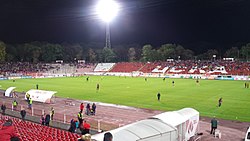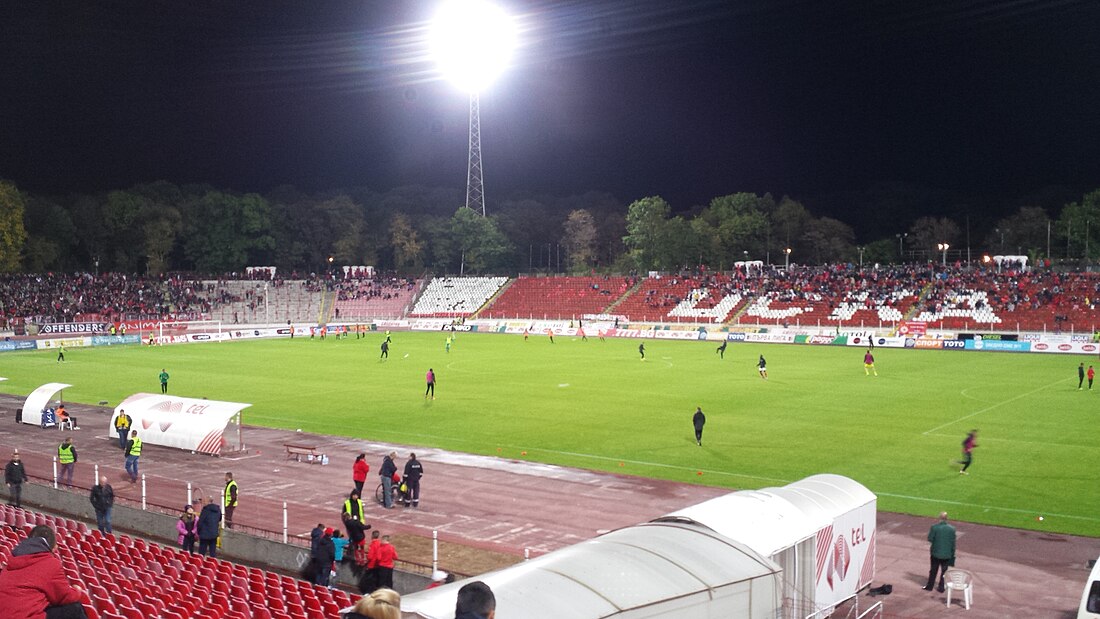Stadion Balgarska Armia
Football stadium in Sofia, Bulgaria From Wikipedia, the free encyclopedia
Stadion Balgarska Armia (Bulgarian: Стадион „Българска Армия“, lit. ''Bulgarian Army Stadium'') is a stadium of the Bulgarian football club CSKA Sofia. It is situated in the Borisova gradina in the centre of Sofia. Until 2024 the stadium had four sectors and a total of 22,995 (18,495) seats,[2] of which 2,100 are covered; the pitch length was 106 meters and the width was 66 meters.[3]
 | |
 | |
| Full name | Bulgarian Army Stadium |
|---|---|
| Former names | Atletik Park (1923–1944) Stadion Chavdar (1944–1948) Narodna Armia (1948–1990) Balgarska Armia (1990–) |
| Location | Sofia, Bulgaria |
| Coordinates | 42°41′3″N 23°20′23″E |
| Public transit | Vasil Levski Stadium; Orlov Most, buses, trolleybuses |
| Owner | Ministry of Youth and Sports (50%) CSKA Sofia (50%) |
| Operator | CSKA Sofia |
| Executive suites | 20 skybox |
| Capacity | 17,376[1] (new ground) |
| Field size | 105m x 68m |
| Surface | GrassMaster |
| Construction | |
| Built | 1965 2024-2026 |
| Opened | 1967 2026 |
| Renovated | 1982, 1997, 2001, 2015, 2016 |
| Closed | 2023 |
| Demolished | 14 May 2024 |
| Construction cost | c. 90 million BGN (€45 million) |
| Architect | Anton Karavelov, Simeon Ivanov Ipa Arch (new ground) |
| Main contractors | Glavbolgarstroy Holding JSC (new ground) |
| Tenants | |
| OSK AS-23 (1923–1944) Chavdar Sofia (1944–1948) CSKA Sofia (1948–2023); (2026–) | |
| Website | |
| www.stadium.cska.bg | |
The capacity of the old stadium was divided in four sectors:
- Sector A: 6417 seats
- Sector B: 4889 seats
- Sector V: 5689 seats
- Sector G: 6000 (1500 seats[4])
The sports complex also includes tennis courts, a basketball court, and gymnastics facilities, as well the CSKA Sofia Glory Museum. The press conference room has 80 seats.
In late 2023, the stadium was closed, in preparation for its reconstruction, which will involve a complete overhaul and demolition of the current stands and rebuilding the stadium into a football-specific stadium, without an athletics track. During the process, CSKA would play home matches at the Vasil Levski National Stadium, situated only a couple of hundred meters away from the Bulgarska Armia. In 2024 the stadium was demolished and the construction of a new 16,021-seat venue began on the same site.[5]
History
Summarize
Perspective
Built in 1923 for AS-23, the stadium was known as Athletic Park until 1944, when AS-23 merged with two other clubs to form Chavdar Sofia. From 1944 until 1948 it was called Chavdar Stadium. Between 1948 and 1990 it was the People's Army Stadium, and since 1990 it is the Balgarska Armia Stadium. The current structure was built by architect Anton Karavelov in the period between 1965 and 1967 on the old grounds of AS-23. It was reconstructed again in 1982, which included the introduction of floodlights.
In 2000, the stadium was equipped with a new Dynacord surround sound system, capable of 48 kilowatts and 107 decibels. The electric lighting is also of the latest generation and is covering the pitch with 2100 lux.
Despite the improvements over the years, parts of the stadium are in a deteriorating condition, especially sector B, which has been completely closed down for spectators and covered with advertising instead, in order to hide the growing plant and fungi life underneath. The seating of the stadium is also in a poor condition, with many seats being either partially broken or missing completely, with the main cause abdication of the state that owned the facility until 2023.[6]
The last game on the old stadium was held on 10 December 2023, between CSKA and Ludogorets Razgrad, ending in a 0-1 loss for CSKA. After the match, fans on the stadium were allowed to take a piece of the stadium as a memory from the venue before demolition begins.[7]
Reconstruction plan
Summarize
Perspective
In 2023 CSKA and the Ministry of Youth and Sports established a joint venture, which should undertake reconstruction of the stadium. The reconstructed stadium will have 17,376 seats and meet UEFA Category 4 criteria.[8]
In October 2023 a building permit was granted by Sofia municipality. At the end of May 2024, the entire old stadium was demolished in order to build a new and modern one with a capacity of about 17,000 seats.
On 19 September 2024 CSKA announced a signed contract for construction with the Bulgarian leader in the construction industry, Glavbolgarstroy Holding.[9] The construction of the main part of the stadium is expected to last 18 months, with completion estimated for the spring of 2026.[5]
On 9 December 2024 the first two reinforced concrete columns for the construction of the new stadium have been transported to the stadium site. The oversized load safely traveled the route between Pazardzhik, where the manufacturing plant is located, and Borisova gradina without disrupting traffic. Each column measures 24 meters in length and weighs 62 tons. These initial elements are designated for the connection between sectors and will be lifted by a 250-ton crane. The columns will serve as the supporting structure for the roof of our new home, with a total of 54 units to be produced.[10]
Transport
Bulgarian Army Stadium is located in the centre of Sofia, Bulgaria. The stadium can be approached by Sofia Metro Line 1, 3 and 4. The nearest Metro station is called Vasil Levski. There are also several paid parking lots in the area, which are of the closed type. The paid car zone in the centre area works every day, except Sundays.
| Service | Station/Stop | Line/Route | Walking distance from stadium |
|---|---|---|---|
| Sofia Metro | Vasil Levski | Red | 500 m 7 mins |
| Sofia Metro | Vasil Levski | Yellow | 500 m 7 mins |
| Sofia Metro | Orlov Most | Green | 700 m 10 mins |
| Sofia Public Bus | Graf Ignatiev | 72 76 204 304 604 | 700 m 10 mins |
| Sofia Public Bus | Orlov Most Square | 76 84 184 204 213 280 304 604 N1 (night) | 600 m 8 mins |
| Sofia Public Trolleybuses | Orlov Most Square | 3 4 5 11 | 600 m 8 mins |
Statistics
- As of 'Тhis statistic will be kept up and running when the new stadium opens in 2026.'
| Match | P | W | D | L | GD |
|---|---|---|---|---|---|
| Domestic | 0 | 0 | 0 | 0 | 0 |
| European | 0 | 0 | 0 | 0 | 0 |
| Friendly | 0 | 0 | 0 | 0 | 0 |
| Total | 0 | 0 | 0 | 0 | 0 |
Top-scorer: TBA
See also
References
Wikiwand - on
Seamless Wikipedia browsing. On steroids.
